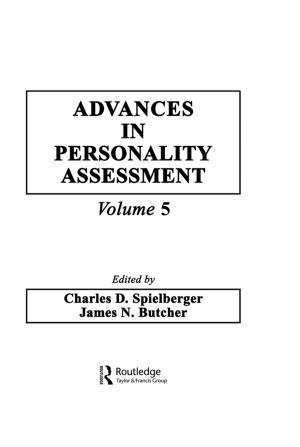Scientific Approaches to Consciousness
Nonfiction, Health & Well Being, Psychology, Cognitive Psychology| Author: | ISBN: | 9781317780915 | |
| Publisher: | Taylor and Francis | Publication: | April 4, 2014 |
| Imprint: | Psychology Press | Language: | English |
| Author: | |
| ISBN: | 9781317780915 |
| Publisher: | Taylor and Francis |
| Publication: | April 4, 2014 |
| Imprint: | Psychology Press |
| Language: | English |
There are many ways to approach the understanding of consciousness. Questions about these ways have occupied philosophers and metaphysicians for centuries. During the early growth of cognitive science the problem of consciousness remained taboo, but an increasing number of studies have either implicitly or explicitly begun to bear on its nature. These have been inspired by a number of different different original questions, and focus on a variety of different empirical phenomena. Thus, studies of implicit memory, subliminal processing, strategic versus automatic processing, allocation of attention, and differences between information processes in the awake versus dreaming state all share a common assumption of a particular quality or state -- awakeness, awareness, alertness, namely consciousness -- that somehow can be distinguished from another type of state or states in which the subject is not aware of the information being processed. What distinguishes the cognitive psychological and cognitive neuroscience approach to the question of consciousness from that of philosophy and metaphysics is scientific methodology: a set of tools that permit the empirical study of a phenomenon in an objective and reproducible way. Recent developments in both the empirical and theoretical methodologies of these fields have made it possible to begin to study the phenomenon associated with -- if not directly underlying -- consciousness in a scientific fashion.
This volume tries to resolve the difficulties associated with the scientific investigation of consciousness. The intent is to explore the extent to which consciousness can be the target of direct scientific inquiry, to get on the table some of the relevant work, and consider the degree to which this research can help inform our understanding of consciousness. It brings together a group of cognitive and neuroscientists to share relevant recent research in the fields of cognitive science and neuroscience and to determine whether any new strategies for the scientific pursuit of this question can be developed. A long-term goal is the development of a unified understanding of consciousness, scientific as well as philosophical perspectives. This volume takes the first step toward building the necessary local bridges.
There are many ways to approach the understanding of consciousness. Questions about these ways have occupied philosophers and metaphysicians for centuries. During the early growth of cognitive science the problem of consciousness remained taboo, but an increasing number of studies have either implicitly or explicitly begun to bear on its nature. These have been inspired by a number of different different original questions, and focus on a variety of different empirical phenomena. Thus, studies of implicit memory, subliminal processing, strategic versus automatic processing, allocation of attention, and differences between information processes in the awake versus dreaming state all share a common assumption of a particular quality or state -- awakeness, awareness, alertness, namely consciousness -- that somehow can be distinguished from another type of state or states in which the subject is not aware of the information being processed. What distinguishes the cognitive psychological and cognitive neuroscience approach to the question of consciousness from that of philosophy and metaphysics is scientific methodology: a set of tools that permit the empirical study of a phenomenon in an objective and reproducible way. Recent developments in both the empirical and theoretical methodologies of these fields have made it possible to begin to study the phenomenon associated with -- if not directly underlying -- consciousness in a scientific fashion.
This volume tries to resolve the difficulties associated with the scientific investigation of consciousness. The intent is to explore the extent to which consciousness can be the target of direct scientific inquiry, to get on the table some of the relevant work, and consider the degree to which this research can help inform our understanding of consciousness. It brings together a group of cognitive and neuroscientists to share relevant recent research in the fields of cognitive science and neuroscience and to determine whether any new strategies for the scientific pursuit of this question can be developed. A long-term goal is the development of a unified understanding of consciousness, scientific as well as philosophical perspectives. This volume takes the first step toward building the necessary local bridges.















